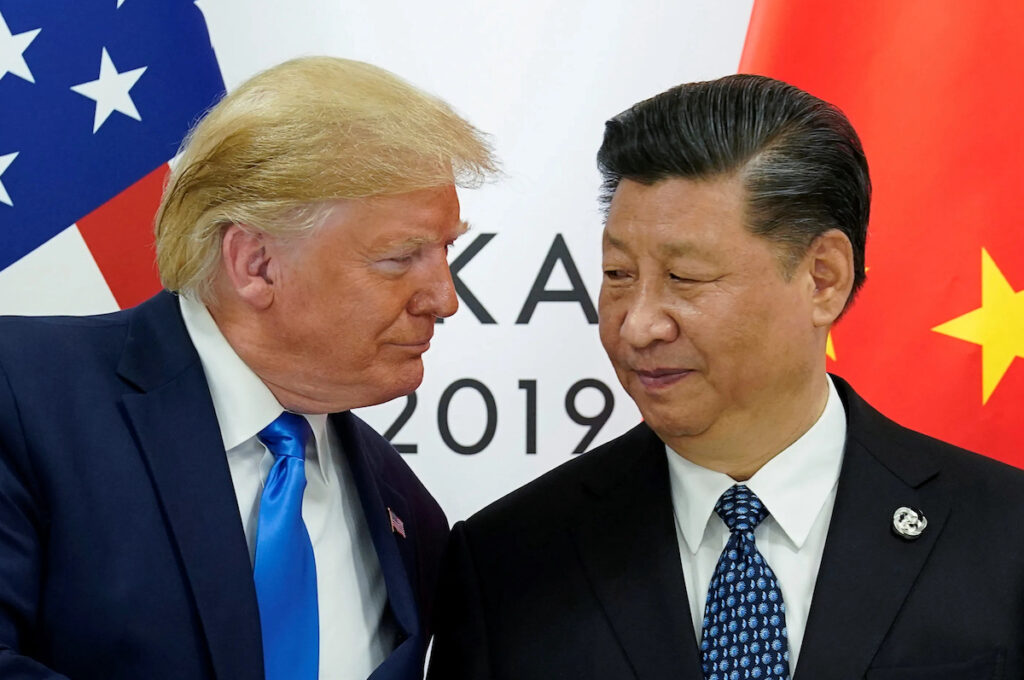US President Donald Trump and Chinese President Xi Jinping’s surprise phone call—marking the first direct communication between the leaders in months—may signal a temporary thaw in an otherwise frosty and structurally adversarial relationship.
While America’s restoration of Chinese student visas and China’s resumption of blocked critical mineral trade suggest detente, this contact, like others in the history of US-China summits, could quickly prove to be more performative than substantive.
The danger lies not in dialogue but in the illusion that the leader-to-leader call, which Beijing insisted Trump requested, will meaningfully alter the deep geopolitical, ideological and economic divergences that define Sino-American relations today.
News reports said Xi told Trump to roll back tariffs and other trade measures that are roiling the global economy while warning him about intensifying the dispute over Taiwan.
Trump claimed on social media that the call delivered a “positive conclusion”, including on China’s restrictions on critical mineral exports, and that lower-level discussions on trade would follow.
He said, “We’re in very good shape with China and the trade deal.” Both leaders invited each other to visit their countries. However, reports noted that there was nothing in either side’s official statements to indicate the critical mineral issue had been resolved.
And China has reasonable cause to remain on guard despite Trump’s post-call positivity. Let us count the many impediments to real and lasting reconciliation:
1. Trump’s strategic incoherence
The most acute danger stems from Trump’s lack of strategic coherence. Unlike the Kissinger-Nixon doctrine of detente, which was structured, calculated and guided by a realpolitik vision of global balance, Trump’s approach is reactive and transactional and thus prone to Chinese manipulation.
Concessions, including the reopening of student exchanges on the US side and lifting critcal mineral restrictions on China’s—appear to be issued in exchange for vague “reciprocity” rather than any long-term strategic realignment.
For Beijing, such inconsistency is easily exploitable. Xi understands that Trump is prone to tactical surprises and policy reversals, allowing China to notch one-by-one concessions while offering minimal structural reforms or broad policy changes in return.
This understanding of Trump’s tactics and views may also embolden China to keep testing US resolve and commitment in the Taiwan Strait, East Sea and South China Seas, knowing that by doing so it strengthens its negotiating leverage in wresting future US concessions.
2. The illusion of de-risking
Much has been made of US-endorsed “de-risking” from China without actually “decoupling.”
The resumption of trade in critical minerals—crucial to US defense and clean energy sectors—signals a potential pause in America’s techno-economic containment of China, which if lasting, would contradict the bipartisan consensus in Washington that China poses a “systemic challenge.”
This could also send mixed messages to allies such as Japan, South Korea and key ASEAN economies, many of which are now being pressured to restrict technology transfers to China, particularly in regard to AI and quantum computing.
If Trump reverses this posture, potentially at a Trump-Xi in-person summit, it would necessarily undercut the anti-China coalition the US has been trying to build since 2017 and signal a climbdown of epic proportions.
3. Symbolism as substitute for policy
An in-person summit with Xi would give both leaders global optics, something they arguably both need as their hardline stances cause political tremors at home and restlessness abroad. Yet symbolism without substance carries its own risks.
The 2019 Mar-a-Lago summit and the 2018 G20 truce in Argentina were celebrated photo ops that ultimately yielded few strategic gains. Indeed, they were followed by tariff escalations, cyber accusations and deepened distrust.
Xi, ever conscious of China’s “national rejuvenation” drive, may use a summit with Trump to signal that China is not isolated—even amid Western efforts to contain it – and that he brought the US to heel through his tough negotiating posture.
Should he succeed in presenting Trump as a president willing to do business without political preconditions, it will bolster China’s power on the world stage. This symbolism would serve Xi well amid research that shows China is straining under the weight of assisting various countries when its own economy remains fragile.
4. Managed rivalry, mutual deceit
There will be a temptation to portray a Trump-Xi summit as a return to the two sides’ previous “managed rivalry” model. Yet this notion is predicated on mutual trust, which no longer exists.
A brief thaw may offer breathing space for both, but there is no sign yet of lasting strategic stability.
During the previous Cold War, the US and Soviet Union were able to negotiate arms control and crisis management protocols. No such guardrails exist between the US and China today.
The resumption of critical mineral trade and educational exchanges, while welcome, won’t be enough to reverse mutual mistrust, especially when military encounters in the Taiwan Strait or the South China Sea could easily still spiral out of control.
Increasingly politicized charges against Chinese nationals in the US are fueling that mistrust. Those include new accusations that China is involved in “agro-terrorism” that aims to wipe out US barley, wheat and corn yields by up to 50%. A PhD researcher of Chinese origin at the University of Michigan has been arrested in this connection.
A potential Trump-Xi summit – despite stage-managed positive vibes and smiles for the cameras, could be yet another empty ritual—a theatrical handshake over unresolved and deep contradictions.
To be sure, both leaders have reasons to engage. Trump seeks headlines as his popularity slips ahead of 2026 midterm elections; Xi seeks legitimacy for his tough negotiating posture that risks millions of Chinese factory jobs.
But neither is offering a strategic roadmap that can reassure domestic or global audiences. Without a shared understanding of what strategic competition entails, and without mechanisms for escalation control, the optics of detente will only mask a rivalry that still threatens to spiral deeper and deeper into conflict.
Phar Kim Beng, PhD, is professor of ASEAN Studies at the International Islamic University of Malaysia and a senior visiting fellow at the University of Cambridge.

